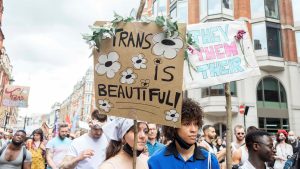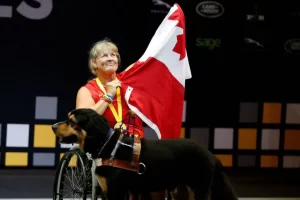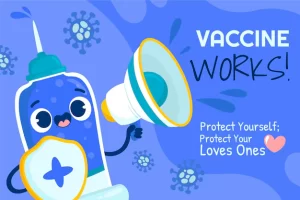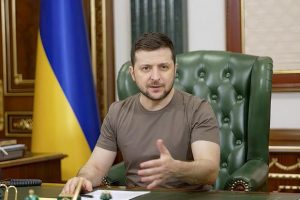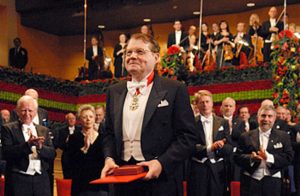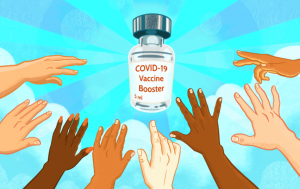He has been compared to Churchill standing alone against the Nazis, to David battling Goliath, and has been called a “revolutionary Jewish hero.” Volodymyr Zelensky, Ukraine’s young president, certainly has something of all these elements and he has demonstrated tremendous courage in the face of a vicious Russian onslaught.
At the same time, as a former actor and as a consummate PR strategist, Zelensky has played to the hilt the image of Ukraine under threat of annihilation by Russia. He has often invoked a similarity between the plight of Ukraine today and the Holocaust, when the world stayed silent in the face of extermination. In a recent address to the Israeli parliament Zelensky accused Russia of genocide and of planning a “final solution” for the Ukrainian people.
But while what is happening in Ukraine is horrendous, it is not genocide. In WWII, the Jews were defenseless, weak and scattered. In the current Ukraine/Russia conflict, Ukraine has an army, a huge country and a population of 40 million. Furthermore, if Russia were to win its war and occupy Ukraine, it would not proceed to exterminate all Ukrainians. It would undoubtedly stifle opposition but, as long as Ukraine fell into line, the country would survive and even thrive. The analogy with what happened to the Jews of Europe or with the existential threat looming over Israel, should enemies like Iran win the upper hand, is totally false.
One comparison however is partially valid, that with Israel during its War of Independence. In 1948, as the fledgling Israeli state was attacked by 6 Arab armies, it was confronted by a crippling arms embargo. Not only did the West (the US & UK) refuse to supply arms to Israel, when its army possessed one gun for every three soldiers and an air force consisting of no more than a dozen light aircraft, but it imposed an embargo applicable to all UN countries. Fortunately one country had the temerity to flout the embargo. During this critical period, little Czechoslovakia supplied Israel with large quantities of arms, ammunition and fighter planes. It also trained Israeli pilots. In order to evade the embargo, the Czech planes were dismantled, shipped as separate parts and reassembled in Israel. Helping Israel was not just a way of earning much-needed cash for Czechoslovakia, it was also a moral issue and played a decisive role in the outcome of the war. “Czechoslovak arms saved the State of Israel, really and absolutely,” said Israel’s first Prime Minister, David Ben Gurion. “Without these weapons, we wouldn’t have survived.” Albeit late in the day, the West has shipped arms, anti-aircraft systems, drones and missiles to Ukraine. But no country has, as yet, dared to send it fighter planes.
Another emotional button which Zelensky keeps pressing is the claim that the Ukrainians rescued Jews during WWII. It is true that 2,673 Ukrainians have been recognized as Righteous Gentiles for having saved Jews during the Holocaust. But, while making his claim, Zelensky forgets to point out that 1.5 million Ukrainian Jews were murdered in Ukraine during the Holocaust. Israeli commentator Caroline Glick has described Zelensky’s emphasis on the rescue of Jews as “sick historical revisionism,” noting that the “Ukrainians were active, enthusiastic Nazis and that Ukrainian Jewry was not annihilated in Poland but in Ukraine, by their neighbors.” Ukrainian Nazi collaborators played a major part in the mass murder of nearly 40,000 Jews at Babi Yar and their cruelty is legendary.
Of note is the fact that no Ukrainian collaborators were ever brought to trial in post-war Ukraine. On the contrary, they are revered as national heroes. One such ‘hero’ is Stepan Bandera whose Ukrainian Insurgent Army fought alongside the Nazis and killed thousands of Jews and Poles. Bandera was named “Hero of Ukraine” by former president Viktor Yushchenko and monuments venerating him can be found across western Ukraine. In 2014, Kyiv named one of its major streets “Stepan Bandera Avenue.” Even Zelensky recognizes Bandera as a hero.
Another illustration of Ukrainian support for rabid anti-Semites is the veneration shown to Bohdan Khmelnytsky, the notorious Cossack hetman whose men slaughtered 50,000 Jews in the 17th century. A colossal monument to Khmelnytsky stands in Sophia Square, right the center of Kyiv. The third anti-Semite after whom streets and monuments are named in Ukraine is Simon Petliura who was responsible for the massacre of thousands of Jews during the infamous pogroms of 1918-1921. Historians estimate that over 100,000 Jews perished in these pogroms, the scope and brutality of which were unprecedented. Here is how the Tablet magazine describes what happened: “Armed militants, with the acquiescence and support of large segments of the population tore out Jewish men’s beards, ripped apart Torah scrolls, raped Jewish girls and women and, in many cases, tortured Jewish townsfolk before gathering them in market squares, marching them to the outskirts of town and shooting them. On at least one occasion, insurgent fighters barricaded Jews in a synagogue and burned down the building” (The Killing Fields of Ukraine.) As the author of the article observes: “when the Germans arrived, they found a decades-old killing ground.” And yet, in 2016, a minute of silence was observed in Ukraine to mark the 90th anniversary of Petliura’s assassination in Paris at the hands of Sholom Schwartzbard, who lost fifteen of his relatives in the pogroms. Khmelnytsky, Petliura and Bandera are considered heroes in Ukraine because they fought for Ukraine’s independence but this should not obscure the fact that they were also murderers who were guilty of crimes against humanity.
One of the so-called justifications made by President Putin for the invasion of Ukraine was that Ukraine had become a Nazi state and needed to be de-nazified. As Caroline Glick notes, Putin’s claim may have been over-the-top but it is not totally unfounded. “There are a lot of Nazis in Ukraine,” she writes pointing out that Zelensky himself owed his 2019 election to the support of Arsten Avakov, a leading Ukrainian Nazi. She also notes that the Azov Battalion, a neo-Nazi militia, is part of the Ukrainian National Guard and has played a significant role in the recent fighting in Mariupol and Kharkiv.
Evidently, in order to survive in the maelstrom of Ukrainian politics (Ukraine is ranked among the three most corrupt nations of the world), Zelensky has to walk a delicate tightrope, placating both the democratic as well as nationalist, far-right elements in his electorate. This must be the only explanation for his association with outright anti-Semites.

